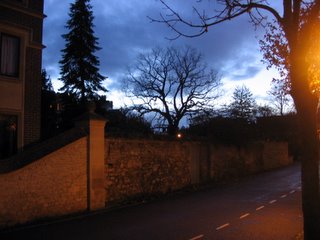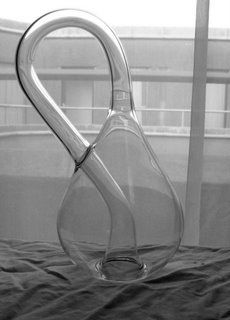
Happy Birthday Nick Sayeg
The most surprising thing about my three pound Tesco brand radio alarm clock is that came set to use one of the BBC talk channels as the wake-up noise. I’ve never changed it, and it has been influencing those precious dreams you get in snippets, punctuated by the smashing of the ‘snooze’ button. It is an odd thing indeed to be cajoled out of bed by the sounds of men with British accents discussing recent novels, developments in physics, or U.K. politics. I’ve never been someone who listens to the radio, except as a means of being jolted out of repose. It is too random, too filled with commercials, and too attention intensive in the wrong ways. It’s not something I can ever really enjoy, though it frequently annoys me.
Today’s ‘Advanced Study of IR’ lecture was delivered by Gavin Williams about the politics of development or, as he called it, the politics of most of the world. I particularly appreciated some of the methodological questions that were raised and then discussed among those present. Regrettably, only four of the twenty-eight members of the IR M.Phil were in attendance. After the lecture, I spoke with Dr. Williams for about forty minutes. We talked about British and Canadian politics, the tendency of sub-state political regions with newly-discovered oil reserves to contemplate succession, and the reasons for which institutions persist in making and perpetuating bad policies.
Aside: Thesis considerations
This evening was also the first chance in quite a while when I got to talk about my intended thesis topic . Dr. Williams’ enthusiasm has reaffirmed my hope that it will be a useful project, though I need to decide upon a way to pare it down to an M.Phil thesis sized question. The general project is to examine institutional and legal mechanisms for dealing with the advancement of environmental science. Environmental science involves quite a bit of uncertainly. By definition, complex dynamic systems (like ecosystems and the climatic system) are hard to understand. What we need are policies that are based on the best knowledge we have, aware of the extent to which those conclusions might be incorrect, and able to respond to new developments. Basically, the people doing the science and the people making the policy need to talk to one another, understand what is being said, and care about it.
The basic point is that there are separate intellectual communities: scientists, lawyers, policy makers, etc, who don’t manage to communicate effectively about environmental issues in many cases. That, or they fail to produce outcomes that make long-term environmental sense. Members of all these groups can also be co-opted by those who profit from the status quo. We need to consider interests and incentives, as well as modes of communicating and types of interpersonal connection. It’s not just who reads what journal, goes to which conference, or understands which piece of jargon; it’s who pays for the research, who pays attention to the policies, and who stands to lose or gain from all of this.
The question has many faces. You can look at the professional discourse of the different groups and try to understand where they understand one another, where they do not, and why. You can concentrate on the incentives presented to each group, particularly in terms to how they relate to one another. Are policy-makers rewarded for basing their strategies on sound science? Are rewards long-term or short-term? Perhaps the best way to tackle many of these issues would be to choose a case study. An obvious choice is climate change, due to the lack of scientific certainty and the level of political involvement, but I shy away from it. It’s too big, too politically charged, and it involves uncertainties that are too great. It’s not that climate change isn’t happening or that people aren’t causing it. What we don’t know is what the consequences of climate change they will be, who will bear the costs, and whether the cost of dealing with climate change exceeds the cost of stopping it. I don’t think we have the science to answer these questions right now, though it would definitely be good to have an effective and relatively de-politicized channel for turning increased certainty into more refined policy once we do.
I called Meghan briefly tonight, to say thank you for the Klein Bottle. Apparently, her graduation was yesterday and she gave the student address. I hope her family and friends were there to see it, and that enjoyment was had all around. My felicitations to Meghan Lynn Mathieson, B.A. Hons. (UBC). Best wishes in future endeavours.
Later, Nora prepared an excellent veggie casserole for Bilyana, Bryn, Kelly and me. It was thoroughly enjoyed by all and, furthermore, it was good to spend some time talking with other Wadham students. I’ve barely seen Bilyana since first week. As a mathematician, she was also particularly qualified to appreciate the Klein Bottle, which I felt near-obligated to show her.
Tomorrow evening, I have supervision with Dr. Hurrell: discussing the paper on the Chinese Civil War. Afterwards, I am supposed to watch Spirited Away with Margaret. For those who haven’t seen it, I thoroughly recommend it. It’s my favourite Studio Ghibli film: notably for creative combination and reinterpretation of elements of several different strains of folklore. Also, the artwork is quite stunning. Studio Ghibli also made Princess Mononoke, My Neighbor Totoro, Howl’s Moving Castle, and Castle in the Sky. The studio is headed by the extremely talented Hayao Miyazaki, and I recommend their work without exception.
- Lauren sent me some Nina Simone songs, and I like them a lot. Especially good is the song “Feeling Good.”
- Here’s another Oxford blog, with a unique premise.
- I now have 24 hour access to the Manor Road Building and the Department of Politics and International Relations. Don’t you envy the fact that I could be in there, drinking in the greenish light and pouring over readings or stats assignments every Saturday night, all night long?
- Penn Jillette on athiesm. From Jessica.
- The L.A. Times has a distressing article about the treatment of pre-war intelligence. (Via BoingBoing)
- I am quite curious about what has happened to Kerrie Thornhill. I knew she was going to Ghana, but not exactly when. Unusually, all five or so of her blogs are silent. If anyone knows what’s up, I’d appreciate being filled in.
- Today’s big environmental politics story



